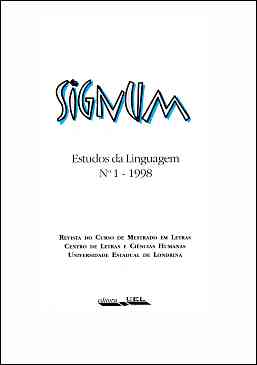Prosodic Emphasis And (Socio)Linguistic Variation
DOI:
https://doi.org/10.5433/2237-4876.1998v1n1p73Keywords:
Prosodic Emphasis, Linguistic Variation, Brazilian Portguese.Abstract
In this article, my main objective is to discuss the relationship focus/variation, and examine, more precisely, three studies of the phenomena of language variation in contemporary Portuguese spoken in Rio de Janeiro: (a) of Fausto (1992), whose analysis is based on the phenomenon of assimilation of -ndo/-no (cf. -'falando' / 'falano', for example), (b) of Gonçalves (1993), about the processes of insertion (prosthesis) and cancellation (aphaeresis) of [a] at the beginning of words (as in 'atropeçar' and 'cabar', respectively), and (c) of Brunner (1995), who addresses intensification strategies as used in Portuguese. All three start from the theory of sociolinguistic variation (cf. Labov, 1966 and 1972), seeking to establish, therefore, groups of linguistic and extralinguistic factors that may pose constraints to the application or non-application of a variable rule.Downloads
Download data is not yet available.
Downloads
Published
1998-07-15
How to Cite
GONÇALVES, Carlos Alexandre Victorio. Prosodic Emphasis And (Socio)Linguistic Variation. Signum: Estudos da Linguagem, [S. l.], v. 1, n. 1, p. 73–84, 1998. DOI: 10.5433/2237-4876.1998v1n1p73. Disponível em: https://ojs.uel.br/revistas/uel/index.php/signum/article/view/4482. Acesso em: 10 feb. 2026.
Issue
Section
Article
License
Copyright (c) 2025 Carlos Alexandre Victorio Gonçalves

This work is licensed under a Creative Commons Attribution-NonCommercial-NoDerivatives 4.0 International License.
This journal reserves the right to make, in the originals, normative, orthographic and grammatical modifications in order to maintain the standard language and the credibility of the publication. It will respect, however, the authors' style of writing. Modifications, corrections and suggestions of conceptual order will be forwarded to the authors, if necessary. In these cases, the papers, once appropriate, should be submitted to a new appreciation. The final examinations will not be forwarded to the authors. Works published become property of Signum, being its total or partial reprint subject to an explicit authorization of the journal. In all subsequent quotes the original source of publication should be mentioned, in case, in Photographic Discourse. Opinions emitted by the authors are their exclusive responsibility.
















